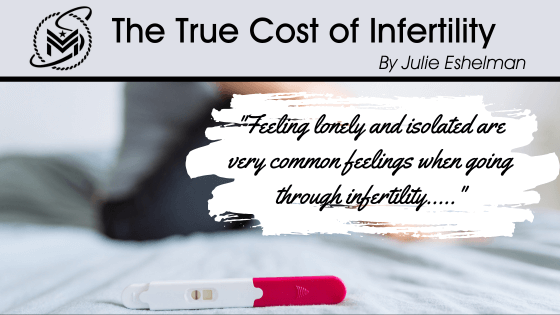When someone hears “infertility” they usually think of in vitro fertilization (IVF) and the expenses that are often associated with it due to lack of insurance coverage or the need to do multiple rounds.
However, there are so many other areas of our lives that are also affected by infertility. Infertility impacts not only finances, but also quality of life, relationships, mental health, physical health, and timelines for family planning.
The Expense of Infertility
As you may or may not know, TRICARE only covers fertility treatments for service-connected injuries or illnesses, leaving many military and veteran families without insurance coverage for these costly treatments.
The average cost in the US for one round of IVF ranges from $10,000 – $25,000 depending on the part of the country you are living in.
That doesn’t include the cost of the medications associated with IVF which average anywhere from $4,000 to $7,000 depending on the protocol being used by the doctor.
That is a lot of money, and by the time most people reach IVF they have tried other less expensive options, but have still likely spent thousands of dollars on those options and the associated medications.
Quality of Life
Now, you might be wondering how families come up with the money to pay for fertility treatments, and it usually means they are sacrificing all their non-essentials.
For my husband and I, we gave up cable TV, our second car, vacations, going out, and anything extra we could like Starbucks, manicures, new phones, etc.
Seriously, we have limited our spending to pay for fertility treatments. We haven’t been to the movie theater since 2019, and our last vacation was in 2016.
It’s been hard, giving up all of the extra things that added to our lives, but we so desperately wanted to have kids of our own. Others opt to take out loans or use credit cards to pay for treatments, either way, it impacts your quality of life because at a point, at least for me, I became jealous of all the things that my friends and peers were doing that I just couldn’t afford to do.
Relationships
So not only was I becoming jealous of the trips my friends were taking, or the new gadgets they were buying, but I was also jealous of their ability to have kids. I couldn’t talk or hang out with friends who were pregnant or had babies because it was too painful and a constant reminder that I couldn’t do this one thing, have a baby.
Our financial circumstances of spending all this money on fertility treatments and saving every way we could also meant that we turned down a lot of invitations to go out, go on trips, and even attend special events.
All of those no’s started to impact our relationships, in a very negative way. Friends stopped calling with invitations because we always said no. It also impacted the relationships we had with family because of the pressures on us to have kids, for us to come visit, and that once we did share what we were going through they didn’t really understand what it was like or how to help.
Life with infertility became very lonely as it became too painful or strained to carry on many of the relationships in my life, and I know that I am not alone in this feeling and that many others facing infertility go through some of these too.
Mental Health
Feeling lonely and isolated are all very common feelings when going through infertility, but if you haven’t noticed all of these so-called “costs” are building on one another. Finances, quality of life, and relationships all impact our mental health and are all high stressors for depression.
Then add on feelings of not being enough because you can’t get pregnant, not being able to give your spouse children or any number of other negative thoughts that cross your mind while on this journey.
And these issues don’t just impact one spouse or gender more than the other, these are issues that anyone can be influenced by. Infertility, fertility treatments, and the results of those treatments have very real impacts on our mental health, not just in those moments, but even years after we have resolved our family building journeys.
Physical Health
One’s physical health can also be a cost of infertility. The medications used for fertility treatments are often hormones, and boy do they mess with you.
I’m talking about Hollywood portrayals of hormonal and emotional people, mood swings, crying fits, etc. Sometimes that is what it is really like for someone undergoing IVF.
Speaking of medications, most of them are injections, given at home, some with some really big needles. And they hurt, burn, leave bruises, bumps, and knots, and leave you feeling like a human pin cushion. T
here is also the wear and tear on your body that years of trying and treatments have on you physically. For some, their mental health impacts their physical health with weight gain or loss because of depression.
Then there is also the ticking biological clock for when our time to have kids may eventually run out.
Timelines for Family Building
For most people, they don’t learn there is a fertility issue until they have already been trying to build their family. At this point, they are usually about a year into the timelines and plans that they have had for starting a family.
For my husband and I, it was starting our family while we were stationed near family, my husband being in a low-demand position, and being ready to have kids.
Deployments, separations for schools, and high-demand positions usually aren’t ideal times to have a baby in the house, but all those go out the window when you are diagnosed with infertility.
So do plans like having kids by the time you are 30, or any other timeline you had for having kids, including the spacing of those kids.
So How Can You Help
Infertility doesn’t just cost a lot of money for fertility treatments but all of the sacrifices and effects that it has can cost a lot for the families that are on this journey.
So if you’ve stuck with me this long maybe you are wondering how you can help. Well, for starters you can allow your friends or family some grace, whether or not you know what is going on, you can likely tell that something is going on.
Infertility comes with a lot of emotional baggage and those with infertility need your grace and unconditional support.
Don’t stop reaching out, inviting them to things, and make sure they know you are there.
Understanding and realizing that infertility truly costs more than we realize goes a long way toward being able to support someone going through fertility treatments by being able to recognize all the areas of their life that infertility effects.
*To read more of Julie’s posts, visit her M:M Author Page or check out our recent podcast with Julie HERE.








0 Comments